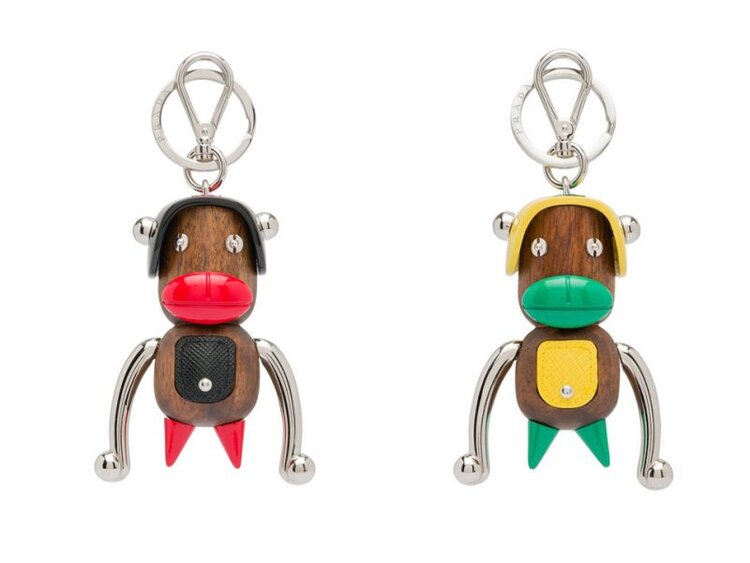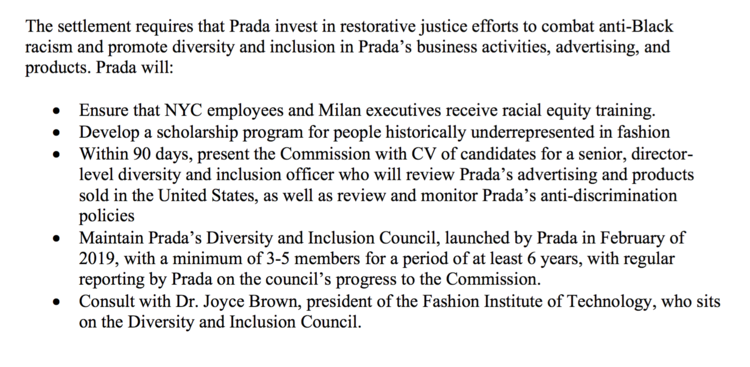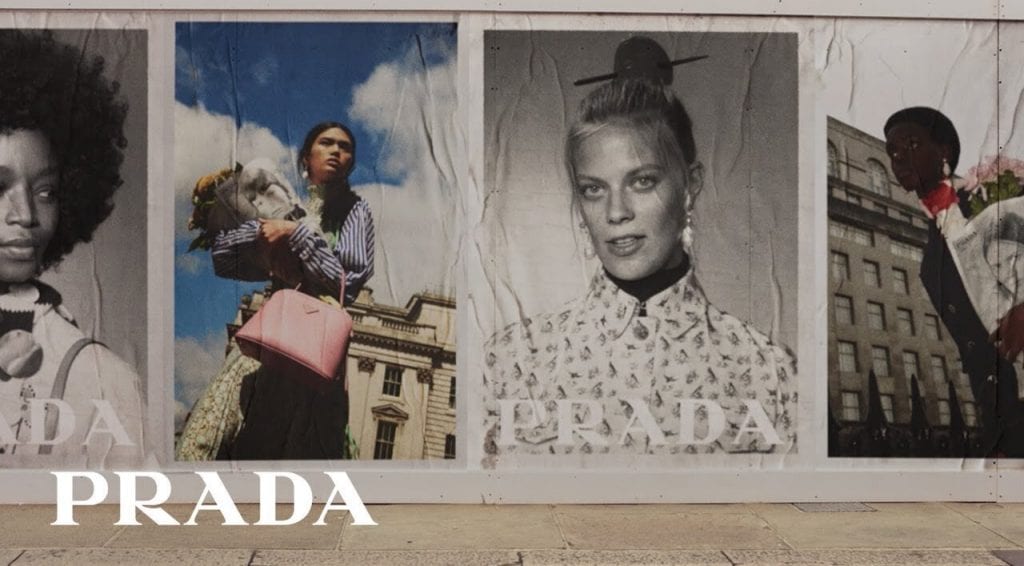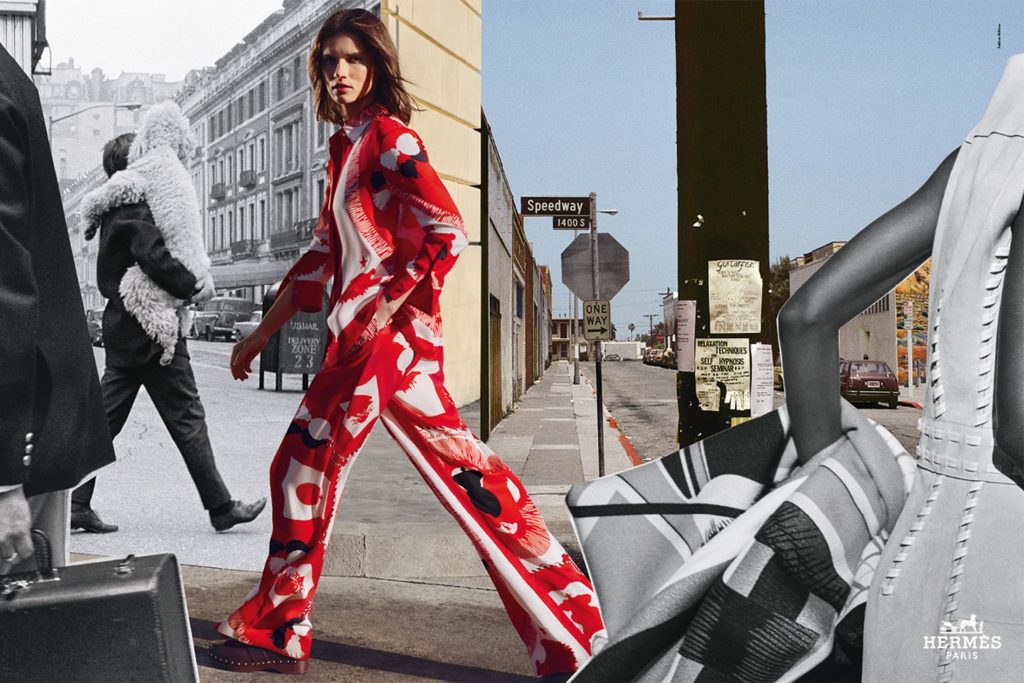In 2019, Gucci and Prada made headlines when they each announced that they would launch ambitious diversity initiatives. After being on the receiving end of accusations of racism the previous year in connection with a $550 monkey figurine it sold in stores across the globe, Prada revealed that it would establish a “Diversity and Inclusion Advisory Council,” an effort co-chaired by writer, director, and producer Ava DuVernay and artist-slash-activist Theaster Gates.
Gucci faced its own charges of racism when it put a nearly $900 blackface-esque sweater on its runway in February 2019. The Milan-based brand responded to the incident by cutting way back on advertising in the U.S. market (where the controversy was the strongest) and vowing to engage in a round of new hires, including 5 new designers who will work in its Rome design studio, and a global director for diversity and inclusion, who will fall under the Gucci America umbrella in New York. Still yet, Christian Dior did its own damage control on the heels of its controversial Native American-themed Sauvage campaign, pulling the ad and issuing a statement saying, “The House of Dior has long been committed to promoting diversity and has no tolerance for discrimination in any form.”
Now, months later, the New York Times reports that those companies’ efforts to address issues of diversity stem at least in part from a run-in with the New York City Commission on Human Rights (“Commission”).
A local government entity, the Commission is tasked with enforcing New York City’s Human Rights Law (“NYC HRL”), which makes it illegal to engage in discriminatory actions on the basis of race, age, gender, and national origin, among an array of other protected traits. Characterized as “one of the most powerful anti-discrimination laws in the country, far stronger than either federal law or most state counterparts,” the more than 50-year old legislation goes further and quite sweepingly prohibits not only discrimination in housing and hiring, but outlaws “prejudice, intolerance, bigotry, and discrimination, bias-related violence or harassment and disorder … [that] threatens the rights and proper privileges of its inhabitants.”
With the provisions of the NYC HRL in hand, the Commission has routinely taken on alleged instances of discrimination in housing and employment. The NYC HRL has also provided the basis for the Commission to file more than a dozen sexual harassment complaints against city officials in recent years, and has led the agency to investigate The Wing, a millennial-friendly private social club and communal workspace, for potentially running afoul of the law with its female-members-only policy. (A rep for the Commission declined to cite any specific potential violations of the NYC HRL that it was investigating in connection with The Wing as of Match 2018).
That same agency is now using the tenets of the NYC HRL to look at how other types of businesses – i.e., places of public accommodation – are conducting themselves, in order to ensure that they are not engaging in discriminatory practices, and Prada, the Milan-based fashion brand with a New York headquarters and three of its own brick-and-mortar stores in Manhattan, is the Commission’s first target.
As it turns out, until very recently, the Commission was investigating Prada in connection with the design and sale of an offensive figurine – the $550 monkey with “a strong resemblance to racist caricatures,” as Bloomberg put it at the time – that set the internet ablaze with fury in late 2018. According to the Times, in light of the brand’s sale of the keychains and considering the intense consumer backlash that followed, the Commission initiated an investigation in December 2018.

Over a year later, Prada has entered into a far-reaching and “highly unusual” settlement with the Commission, which has the authority to enter into settlements that come in the form of monetary fines and damages for those aggrieved by violations of the NYC HRL, and that include “additional remedies including rehiring, policy change, training, and modifications for accessibility.”
According to the Times, Prada’s settlement “requires [it] to provide sensitivity training, including ‘racial equity training,’ for all New York employees within 120 days of signing the agreement, as well as for executives in Milan” – including Prada creative director Miuccia Prada and her husband-slash-fellow co-CEO Patrizio Bertelli, among others – “since the Commission argued that decisions made in Italy have repercussions in New York.”
The terms of the inherently novel agreement – which stems from Prada’s display of the “racist iconography [that] manifests as discrimination on the basis of race, suggesting that Black people are unwelcome,” according to the Commission – also dictate that Prada must “appoint a diversity and inclusion officer … with candidates approved by the [Commission],” and must continue to operate its existing “Diversity and Inclusion Advisory Council” for at least six more years and report to the Commission on a bi-annual basis to review its “progress in achieving the agreement’s goals.”

In short: Prada – which has denied any discrimination in connection with the sale of the figurines – is legally bound to the Commission as a result of its sale of the discriminatory product in its stores in New York City. While Dior refused to comment, Gucci “declined to comment on the status of its discussions with the Commission, though it did not deny the conversations were taking place,” according to the Times.
The Commission’s action against Prada – and potentially Gucci and Dior soon, as well – is certainly striking. Part of novelty at play is due to the fact that while most major fashion brands (even European ones that have sufficient ties to New York to establish jurisdiction) are employers and providers of public accommodations in New York, and thus, are clearly governed by this law, regulating discriminatory products, as opposed to discriminatory actions, is something that this law has not proven willing to do … until now. This new development is arguably even more noteworthy given that the products at play are those of the fashion industry, which is typically given leeway due to the creative aspect of its offerings.
It does not appear that Prada is taking issue with the charges that the Commission has thrust upon on it (maybe it will take defensive action in a more public capacity if it is ever found to be in violation of its new, legally-binding settlement with the Commission). Nonetheless, it is difficult not to suspect that if challenged, the Commission’s response to Prada’s sale of offensive products, would prove to be murky due to potential First Amendment concerns, among other things.
As William Kovacic, a former commissioner for the Federal Trade Commission and a professor at the George Washington University Law School, told the Times, one of the issues at play here is “free speech,” and thus, the First Amendment, the Constitutional provision that prevents the government – including local governments – from making laws that abridge the freedom of speech.
It would not be the first time that the Commission has faced a First Amendment challenge, or the first time that objectionable products have come under the microscope of the courts; in 2015, for instance, the Supreme Court held that the state of Texas could legally reject a proposal for license plates featuring a Confederate battle flag, albeit that decision hinged on the fact that, according to the Justices, the specialty license plate designs constituted government speech.
Since then, the Supreme Court has taken on the issue of offensive trademarks, determining that the U.S. Patent and Trademark Office cannot bar such marks from registration, citing First Amendment grounds. As Harvard Law’s Jeannie Suk wrote for the New Yorker in 2017, “The ruling [in the case over Erik Brunetti’s “FUCT” trademark] makes all manner of racist, sexist, or otherwise insulting terms eligible for federal registration by someone who wishes to use them to identify the goods or services they are selling.”
Suk noted that “denying registration of some trademarks because they are offensive, is , as Justice Kennedy said in the decision of the case, ‘the essence of viewpoint discrimination,’” which is particularly at odds with the principle of free speech.
In a statement on Tuesday, the Commission asserted, “Today’s settlement announcement seeks to remedy the harm Prada caused by establishing unprecedented restorative justice measures at the company to combat anti-Black racism and ensure lasting change.”
J. Phillip Thompson, Deputy Mayor for Strategic Policy Initiatives, echoed this, saying, “The de Blasio Administration is committed to protecting the rights of all New Yorkers to live free of racial bias and discrimination. To see a symbol of Jim Crow-era oppression sold as a luxury bauble is a critical reminder that there is still work to be done.”
Up next? Gucci and Dior apparently, which have been “negotiating” with the Commission, according to the Times, over their own potential legal missteps in connection with allegedly discriminatory products and advertising.











